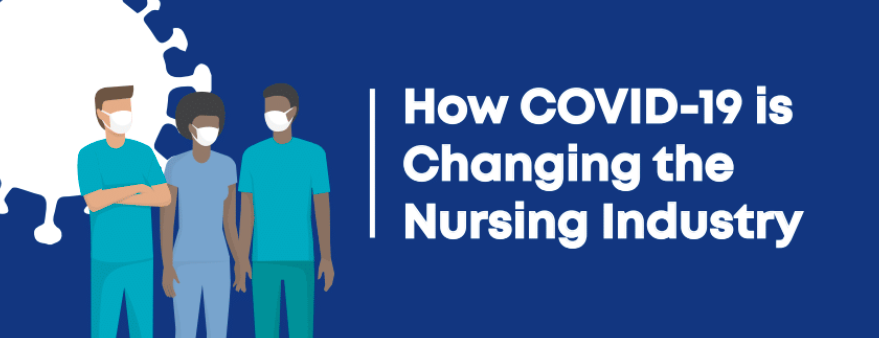In early December 2020, health care workers and citizens experienced the first sign of hope since the pandemic started. The FDA issued the first Emergency Use Authorization for the Pfizer-BioNTech COVID-19 vaccine. Shortly following that announcement, Time Magazine awarded frontline health workers as Guardians of the Year to honor the millions of medical staff who exemplified the best of humanity. The rising number of compassionate, courageous, and selfless nurses looks promising in 2021. However, COVID-19 has influenced significant changes in the nursing industry related to educational opportunities and health protocols.
With the spotlight on health care workers, many educational institutions and health organizations are finding ways to enforce a safe environment for them to learn and treat patients. We’re currently experiencing the aftershocks from the pandemic that point out areas for improvement in the nursing industry and systems. Let’s examine the impact of COVID-19 that changed the nursing industry to better support our nurses and front line workers.
Increasing Efforts to Enhance Online Education
Spring 2020 was a huge awakening for educational institutions as classes were immediately switched to online only. Despite needing the most on-hands experiences through clinical work, nursing students found themselves learning from home. Currently, nursing schools encourage blended learning under a hybrid program of online lectures and reduced hours for in-person clinical work. It’s important to have face-to-face learning that presents opportunities to apply theory and receive immediate feedback.
However, with the high demand for nurses due to the growing job shortage, many colleges are lowering the number of required clinical hours. This is in response to hospitals reducing the number of students present to minimize exposure and transmission. In turn, nursing students pursuing a Bachelor’s degree will not be able to graduate in 4 years with this new limitation. With a shift towards blended learning, we predict that the curriculum will remain the same with newer technology to enhance the learning experience. This will be achieved through virtual simulations that can be incorporated into lesson plans where students can interact with each other freely from their homes.
Providing Resources to Reduce Medical Knowledge Gaps
The two hospital wings that treat the most COVID-affected patients are the ER and ICU. In the United States, hospitals and clinics were at 100% capacity during the winter, with a peak of 129,800 patients admitted nationwide. No hospital could prepare for this influx of cases with the given nursing staff for the respective departments. In order to treat these patients, RNs from other departments were sent to work, but still needed basic training.
Thankfully, the shift towards online learning presented many available online courses for RNs to receive immediate training and knowledge. Additionally, there are nursing organizations that serve as reliable resources to connect RNs with universities that offer free nursing courses. When these programs are accessible and flexible, the nursing industry and workforce will be better equipped to work in unfamiliar environments and treat the patients.
Improving Policies to Prevent PPE Shortages
The PPE shortage we experienced in early Spring has caused health organizations to re-examine their health protocols. While citizens were buying PPE for their personal safety, hospitals were also competing for the same resources – disposable surgical masks, face shields, protective gloves and more. We saw that vendors limited the number of supplies citizens could acquire to prevent hoarding and shortages. During this time, the OSHA developed new recommendations in response to COVID-19 to lower the risk of exposure in health care settings. It served as a general guide for health organizations to outline tiers that required additional PPE. This would optimize the use of PPE by using the equipment when it was a critical situation that had high risk of exposure. With the two policies enacted simultaneously, it was a step towards managing the PPE shortage and making sure supplies would be readily available as soon as possible.
Open Resources to Improve Mental Health for Nurses
Nurse burnout is not a new phenomenon. In 2019, a study reported that 35.3% of their respondents experienced symptoms of burnout prior to the pandemic. Given the demanding workload for the current nursing workforce, nurse burnout is predicted to affect a greater number of nurses, particularly those over the age of 50. Nursing organizations like ANA are currently researching evidence-based preventive strategies to manage burnout, compassion fatigue and depression. It’s important for nurses to feel supported at all times, otherwise it will greatly affect their ability to provide the best patient care. There’s an increasing need for psychological treatment and mental health strategies to protect our nurses – both new and experienced.
Nurse Shortage Resulting in More Available RN Jobs
Nursing has the fastest projected job outlook in the United States. According to the U.S. Bureau of Labor Statistics, employment for RNs is expected to increase by 7% from 2019-2029. Unfortunately, the rate of RNs receiving a BSN or MSN is unable to keep up with the number of nurses retiring. COVID-19 forced many older nurses to retire due to health conditions. In short, there are plenty of nursing jobs available, but not enough nurses to fill these positions. A survey conducted by the American Association of College of Nursing found that 76% of new BSN graduates and 75% of new MSN graduates received a job offer within 6 months of graduation. With the reform in nursing education to reduce the graduation requirements without greatly sacrificing the quality of learning, nursing leaders hope to minimize the gap between graduates and available positions.
Eisenhower Health provides opportunities for RNs. Explore our part-time and full-time positions that best align with your career goals. Our word-class medical center supports our nursing staff by providing them the necessary resources to achieve success. Check out our Career page to find available nursing jobs in specialty areas and join us as leaders in health care.
Originally posted on 26/4/2021
